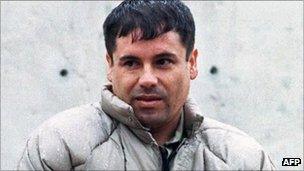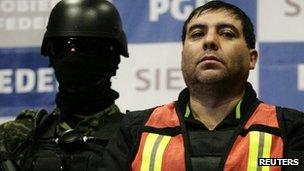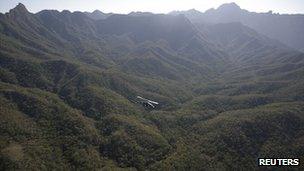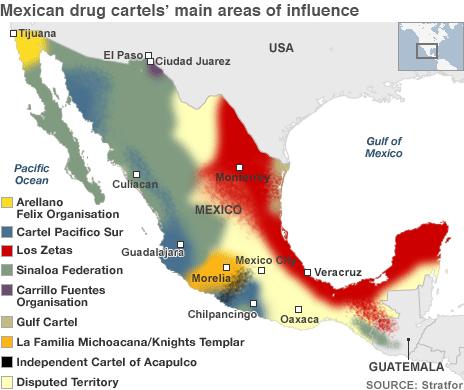Mexico steps up hunt for drug lord Joaquin Guzman
- Published

This image from 1993 shows a jailed Guzman but he has eluded authorities since a 2001 escape
After Osama Bin Laden was killed by US forces in Pakistan last May, the unofficial title of the "world's most wanted man" arguably passed to Joaquin "El Chapo" Guzman.
Guzman heads the Sinaloa drug cartel in Mexico, often described as the most powerful drug trafficking organisation in the Western Hemisphere.
The Sinaloa cartel controls much of the flow of cocaine, marijuana and methamphetamines into the US via air, land and sea, and is believed to have links in as many as 50 countries.
El Chapo, or Shorty, was jailed in 1993 but he escaped his maximum-security prison in a laundry basket eight years later, embarrassing and eluding the authorities ever since.
The US state department , externalhas offered a reward of up to $5m (£3.2m) million) for information leading to his arrest.
'Dead or alive'
In recent months, the Mexican government has turned up the heat on Guzman, reported to be in his mid-50s, and his organisation.
A number of his top lieutenants and foot soldiers have been captured, including his alleged head of security, Felipe Cabrera Sarabia, alias "The Engineer".
In an article last October, the Washington Post, external reported that Mexico had set up three elite teams - from the navy, army and federal police - dedicated to capturing Guzman, dead or alive.

There have been recent high-profile arrests of alleged Guzman associates
In an election year in Mexico, it would clearly serve the interests of the governing National Action Party (PAN) to apprehend him before voters go to the polls in July.
With border security set to be an important issue in the US election too, especially in California, Texas and Arizona, the Obama administration would also welcome such a high-profile arrest.
So could the net now finally be tightening around the billionaire drug lord?
"They know roughly where he is," says Malcolm Beith, author of The Last Narco, a book about the search for Guzman.
"But getting there, mounting the operation and really considering getting El Chapo as the priority, they still have to fix on that."
Mr Beith says that although mid-level traffickers from the Sinaloa Cartel have been detained, arresting Guzman would do much for the PAN's tarnished reputation.
Hi-tech hunt
The party looks likely to lose the election to the party which ran Mexico for more than 70 years, the Institutional Revolutionary Party (PRI).
"Politically, catching El Chapo would be a huge boon to the administration. It would allow them to go into the election with much less criticism. People still talk of a pact between the government and the Sinaloa Cartel. Guzman's arrest would silence critics on that front," said Mr Beith.
But Guzman is not easy to track down.
Some of the US military's top surveillance and eavesdropping technology, including unmanned drones, is currently combing Mexican airspace to try to find him.
He is believed to reside in the isolated mountainous regions of Sinaloa, Durango and Chihuahua states, with an army of hired killers to protect him as well as an extensive network of informants in the security forces.
Washington spent many years and billions of dollars tracking down Osama Bin Laden, notes Samuel Gonzalez Ruiz, a former deputy attorney general in Mexico.
With the resources at Guzman's disposal, the task in Mexico will be just as complicated.
El Chapo Guzman is often compared to Pablo Escobar, the Colombian drug lord who was killed in 1993, but Mr Gonzalez says there are clear differences between the two cases.
"(The hunt for Escobar) was an intensive search over two years in a very defined area which he controlled, Medellin. Here, the Mexican government is facing a very different challenge."
It is not just a question of political will, he argues, but also of methodology and intelligence gathering.
Rival gang
The Mexican authorities would not give details about the hunt for Guzman when his alleged security chief was paraded before the media in December.
That Cabrera's arrest would "affect the structure and leadership of the Sinaloa cartel" was as far as the military spokesman would go.

Sinaloa is Mexico's drug-producing heartland and Guzman's home turf
Guzman is known as a pragmatic operator, creating alliances forged out of blood and marriage while ruthlessly defending his drug routes from rival cartels.
He has used his vast wealth to nurture support among the rural poor and, says Malcolm Beith, where he is not regarded as a hero, he is feared for his brutal treatment of his enemies.
"The government has always said he's a symbolic figure but he's more than that. But when you ask around in Sinaloa, you see the power his name holds. The guy's still got real clout," said Mr Beith.
He is also brazen. As recently as September 2011,his wife, a US citizen and former beauty queen, reportedly crossed into California, external where she gave birth to twins before returning to Mexico without once being questioned by the authorities.
Over the last year, however, Guzman has come under pressure from more than just the security forces. He has seen rival groups, particularly the vast criminal gang called Los Zetas, make inroads into areas previously considered his territory.
But even though El Chapo may no longer have the same control of the drugs trade that he had two years ago, he is still the number one drug lord in Mexico.
If the capture or killing of Joaquin Guzman is to have any real electoral value in Mexico, says security analyst Jorge Chabat, timing is everything.
"If President Calderon and the PAN candidate want to profit politically from El Chapo Guzman, they ideally need to arrest him in April."

- Published27 September 2011